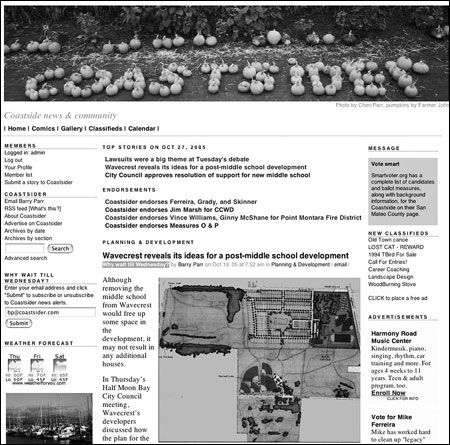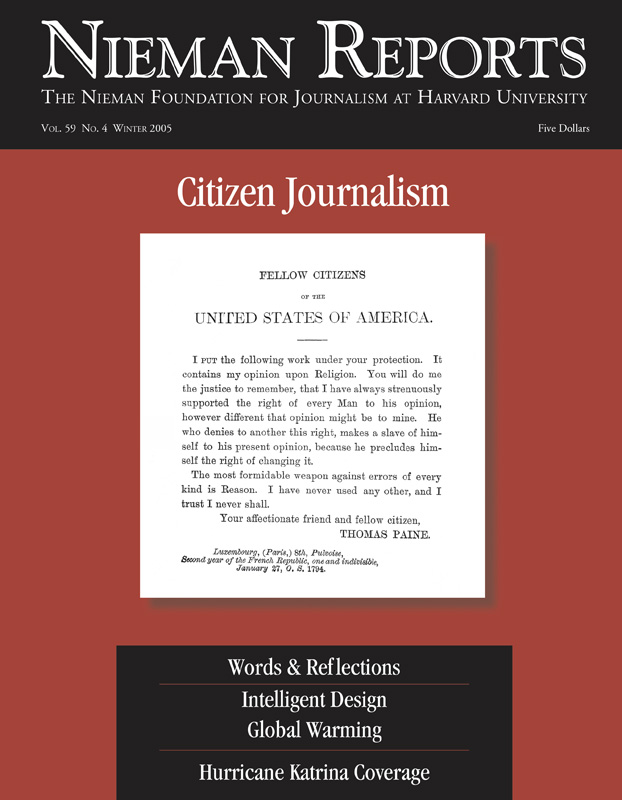
Homepage of Coastsider.
In May 2004, Barry Parr, a former Web site architect for the San Jose Mercury News and CNET’s News.com, introduced his own new Web site to an online audience. His initial goal was to apply what he’d learned about building news sites to the California coastal community where he lived. He described Coastsider—the name he gave his Web site—as “a community Web site for coastal San Mateo County.” Readers who came to this site, he said, would be able “to find out what’s happening now in this amazing community, dig deeper into topics that interest you, and discuss these things with your fellow residents.” Until Parr started to gather local news and commentary on this Web site, he had not practiced journalism. In this article, Parr writes about what he would like to have understood better before he launched his site and found himself becoming a journalist.
For starters, I wish I’d known I was becoming a citizen journalist—before it actually happened. My original plan was to set up a little Web site where community members could share news and link to interesting Bay Area newspaper stories featuring a San Mateo County Coastside angle.
Sometimes I feel like we live in one of those weird little towns that kept popping up in “Twilight Zone” episodes. The Coastside, or coastal San Mateo County, is a 1950’s town separated from San Francisco and Silicon Valley by a wall of fog and a cliff-hugging highway ominously called the “Devil’s Slide.” We still have Halloween costume parades on Main Street, run into our kids’ teachers in restaurants, and pick up our mail at the post office.
And our only local newspaper is a weekly. Nominally we’re in the coverage area of the San Francisco Chronicle and the San Jose Mercury News. But you wouldn’t know it from reading them. Until I started my site, we Coastsiders had to depend on the weekly for the news. If you’ve ever mourned the blandness of corporate journalism, you might have forgotten the pungent taste of old-fashioned, biased, winner-take-all journalism. Imagine a small-town Colonel Robert McCormick or Harry Chandler and you have an idea how many of us feel about our local paper.
There’s one way the Coastside is not stuck in the ’50’s. We have the Internet. My original plan was to build a Web site using the contributions of my friends and neighbors, among whom many were already tearing up the infosphere with pithy posts on a local e-mail list. It would be a place where local experts could help me and others like me understand the issues that mattered in our community. I decided to call it Coastsider.
Despite all my planning, Coastsider became something I hadn’t anticipated. The good news is that it turned out much better than I’d hoped, both for the community and me. I learned a few things along the way and realized what I wish I’d known before.
- I wish I’d known how difficult it is to get smart people who write well to post on a Web site. Suddenly, faced with the prospect of writing for an online publication, all those clever writers clammed up. If I was going to have information on Coastsider, I was going to have to write it myself. So there I was, happily running links to meager Coastside news in the regional dailies, when someone e-mailed me a tip on a real news story that hadn’t been covered by the local paper. An endangered frog had been sighted in the middle of the most contentious development site on the coast. I called up the biologist who’d discovered the hapless frog and learned that he was happy to talk to me. Until that moment, my reportorial background consisted of a year of high school journalism class, which I’d managed to skate through without actually having to interview anyone. The biologist not only gave me a great story but also a picture of the endangered frog squatting in the field in question.
- I wish I’d known how easy it is to get people to talk to you. Well, most of the time, anyway, I get calls back from public officials and private parties. And I’ve discovered some people choose not to return my calls when they don’t like the way I cover the news. Perhaps most startling, I’ve also now seen firsthand that what appears in the newspaper is not necessarily what happened. On more than one occasion, after covering a story, I’ve been surprised to read an account in our local newspaper that is completely different from my own.
- I wish I’d known how fun it is to beat the competition. I would have started in the news business a lot sooner. It’s really addictive. There are weeks now when every story on the front page of the local paper has already been covered in Coastsider. And I love it. You might think I have an unfair advantage, competing with a weekly. But I’m just one guy working part time and they have a half-dozen full-time editors and reporters backed by a newspaper corporation that owns a lot of weekly newspapers. In thinking about the competition, my motto is “Coastsider is not about what’s wrong with the local paper.” Any news source needs to succeed on its own terms. It needs to beat the competition, but the competition can’t be its reason for existing.
- I wish I’d known how hard it is to do journalism well. I’ve now learned by doing it how time-consuming it is to report, write, edit and fact-check news stories with integrity. Every citizen journalist is also a citizen publisher. My roles as editor, publisher, reporter, citizen and neighbor are constantly in conflict. I can’t be objective, because I have a point of view. And Coastsider is fresher and more interesting when I don’t try to hide it. To abandon objectivity, I must replace it with other strong, clearly established values. I’ve chosen openness, accuracy, fairness and thoroughness. To be honest, it would be easier to let everyone have a say, regardless of how valid their opinions. One reason I’m able to write from a very personal point of view and keep a large audience happy is that everyone is encouraged to add comments to stories. If I get my facts wrong, someone is always ready to point it out.
- I wish I’d fully anticipated the depth of this conflict from the beginning, but I’m starting to understand it. The only thing you can do is to wear your point of view on your sleeve and try to be fair. One way I signal my readers that they’re entering an objectivity-free zone is by writing my news stories in the first person. Readers welcome a point of view—as long as it’s clear what you’re doing.
- I wish I’d known how influential I would become. I’m now reaching about 2,000 readers every week, a significant fraction of our local paper’s circulation of 7,000. When you Google local bigwigs, the first result is almost always a Coastsider story. Coastsider is usually the top result when you search most local issues.
- I wish I’d known how many friends I’d make doing this. In the past year, I’ve met dozens of people through Coastsider and gotten strong expressions of support from dozens of others. These days when I go downtown or to the post office, I bump into people I know. I’ve become integrated into this community in a way that I’d never been before.
I don’t wear the label “citizen journalist” comfortably. It implies that the roles of citizen and journalist are separate, and I’m some weird sort of hybrid. All journalists are citizens, aren’t we?
I wish I could know now how this story would end. In its current state, Coastsider could generate enough ad revenue to be a good part-time job, and its audience is growing steadily, doubling in the past six months. I’m beginning to wonder whether it could be a career. I could make it deeper and do more in-depth coverage of the Coastside. Or I could make it broader and cover similar issues in neighboring coastal communities. What I’ve come to realize is that the Web is an ideal medium for delivering ultralocal news and bringing a community together. As much as I love the printed page, I’ve done things with Coastsider that would have been impossible without the Internet.
Since starting Coastsider, Barry Parr has joined Jupiter Research as a media analyst. He was one of the architects of the San Jose Mercury News and CNET’s News.com Web sites. He also writes the Weblog MediaSavvy.



